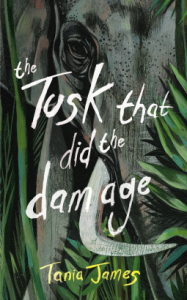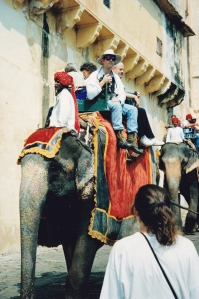 Tania James’s The Tusk That Did the Damage is a story about a couple of very young American film-makers who travel to a Keralan wildlife park in South India to make a documentary about a veterinarian they’ve heard of, who rescues orphaned elephants. One of those orphaned elephants is now on the loose and is being pursued by poachers.
Tania James’s The Tusk That Did the Damage is a story about a couple of very young American film-makers who travel to a Keralan wildlife park in South India to make a documentary about a veterinarian they’ve heard of, who rescues orphaned elephants. One of those orphaned elephants is now on the loose and is being pursued by poachers.
The young elephant orphaned after the brutal death of its mother, initially seized as a baby by poachers earns the name Gravedigger after developing a reputation for covering his human victims with leaves and dirt after death. Having escaped captivity he is being pursued by poachers, a significant price on his head.
Manu is the younger brother of a poacher, disturbed by what he discovers his brother is up to and the lies he tells his wife to cover for his absences. For the sake of his mother, who pleads with him to watch over her eldest son, he follows his brother on this last deadly pursuit, to try to ensure his safety; he knows the danger very well as his best friend was one of the victims of Gravedigger, but he hopes to keep his brother out of danger and trouble.
It is a story of a tribe of elephants in South India, who have lost their ability to roam freely and live as their nature intended, forever changed by their interactions with humans, it is also about those who wish to care for and protect elephants, those who are willing to exploit them and outsiders looking for a sensational story to bolster their careers.
It is a clash of cultures, of people and species who have forgotten how to live in harmony and are having to live with the consequences of their behaviours.
The narrative follows the elephant they name Gravedigger, the film maker Emma and Manu, the younger brother of the ivory poacher.
“Fresh out of college, we’d been looking for a subject for our first documentary feature when I learned about Ravi from an inflight magazine. The photos of fuzzy elephant calves hooked me for the usual cutesy reasons; the description of the veterinary doctor glowed with dramatic potential.”
The story moves between the three narratives, following their lives, looking back at the events that have shaped them until now, leading them towards each other and the inevitable confrontations that beckon.
“The trouble began when my mother found a pouch of bullets in Jayan’s cabinet – thick and crude as if sawed from a steering rod – and thrust the pouch at my father. She felt it a father’s duty to straighten out a wayward son even if the father himself was wayward past hope.”
There is an authenticity to the narrative of the younger brother that has the effect of drawing the reader deep into the lives of his family and neighbours, that his story involves more than just himself may be one of the reasons I was captivated by these sections.
The insights into the perceptions from the elephants point of view are sensitively if briefly handled, I wished this narrative voice could have been even stronger.
“I had never stood in such intimate company with a wild bull elephant or felt its breath steaming upon my face, had never watched the ground beneath my feet fall away until all that remained was the small patch on which I stood trembling. How could a man survive such a thing unchanged? How could he glimpse that unholy omen, a warning as ancient as the oldest of fables, as obvious as a black-bellied cloud, and ignore it?”
An Outsiders Perspective
The film-makers felt unnatural in the environment, lacking understanding, empathy and not spending sufficient time to learn anything, they were the major weakness in the narrative for me. It is interesting having recently read Yasmina Khadra’s The African Equation, that both authors depict a similar stereotype of the Westerner entering into a foreign culture for a short period of time, insufficient to be able to able to understand it from the inside and this case, perhaps not wishing to see it in any other way that a sensational one.
It might be time for me to read Tété-Michel Kpomassie’s An African in Greenland, brought to my attention by Ann Morgan, in her A Year of Reading the World project.
The author ran away from his native Togo, to avoid having to be initiated into a snake cult and after reading a children’s book about a place called Greenland that had no snakes, he made that his destination. For the next twelve years, he travelled overland working his way towards his destination, sharing his observations and experiences. Not just an adventure, his book published in 1977 in France won a literary prize and since Ann Morgan read and reviewed it, the story has been picked up by a film producer.
*
Note: The Tusk That Did the Damage was an ARC (Advance Reader Copy) provided by the publisher via NetGalley.




Hi Claire. I watched a documentary about the story of this baby elephant a few months ago. Elephants are fascinating creatures and I always love to read about them. They are intuitive, sensitive and intelligent. A few years ago scientists discovered that they communicate through vibrations under the ground when they are miles away.This is a book I will read…
LikeLiked by 1 person
They are fascinating Julia, I was attracted to the idea of an elephant protagonist, although it wasn’t written quite as I imagined it could have been, we were witness to the elephant than seeing things from his perspective, however being in the mind of an elephant would be an amazing place from which to view the world.
LikeLike
I love elephants. I wanted to volunteer at an elephant sanctuary in Africa but they don’t accept volunteers — at least when I looked into it about 5 or 6 years ago. No room to house them and also they are afraid the ellies will become too attached to volunteers who then leave.
LikeLiked by 1 person
They are amazing creatures, as are the rhinos, it is so sad they are being hunted into extinction.
LikeLike
I know. I can’t stand it. A director friend of mine has a friend who used to direct music videos. He did one for Michael Jackson in Africa and fell in love with the country. His name is Nick Brandt. He takes the most incredible photographs of animals in Africa and he has started a foundation — Big Life Foundation. They catch poachers and re-train them to help them find and stop poachers. It is amazing work they do. You have to check out his photos — to me he’s like the Irving Penn of wildlife photography.
LikeLike
I just finished An African in Greenland. Definitely an interesting read. Hopefully, I’ll have a post about it written soon!
LikeLiked by 1 person
Brilliant, I am definitely going to get hold of a copy and I hope they do make it into a film.
LikeLike
I read this over Christmas and really wanted to love it – I used to collect toy and ornamental elephants as a kid. But it just didn’t gel for me; the story about the film crew felt as though it had been done before and the structure meant I never really felt like I had a handle on the story. The only bits I really liked were about the wife and how she was treated.
LikeLike
I read An African In Greenland a few years back: it is astonishing. Thanks for the hint that it might be time for a re-read…
LikeLike
I can’t wait to read it and love that it is having a resurgence in popularity thanks to Ann Morgan.
LikeLike
Pingback: Three Ways to Disappear by Katy Yocom – Word by Word